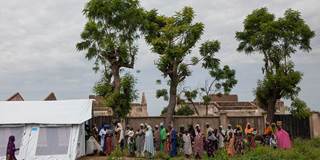The recent Ebola epidemic in West Africa highlighted the urgent need for stronger, more resilient health-care systems in developing countries. But, far from ensuring that outcome, the hasty construction of more health facilities can undermine it.
FREETOWN, SIERRA LEONE – Donors like the World Bank and the World Health Organization often urge developing countries to invest in national health systems. But while rushing to construct clinics and other medical facilities in even the remotest regions may seem like a straightforward approach to ensuring universal health coverage, that has not turned out to be true.

FREETOWN, SIERRA LEONE – Donors like the World Bank and the World Health Organization often urge developing countries to invest in national health systems. But while rushing to construct clinics and other medical facilities in even the remotest regions may seem like a straightforward approach to ensuring universal health coverage, that has not turned out to be true.